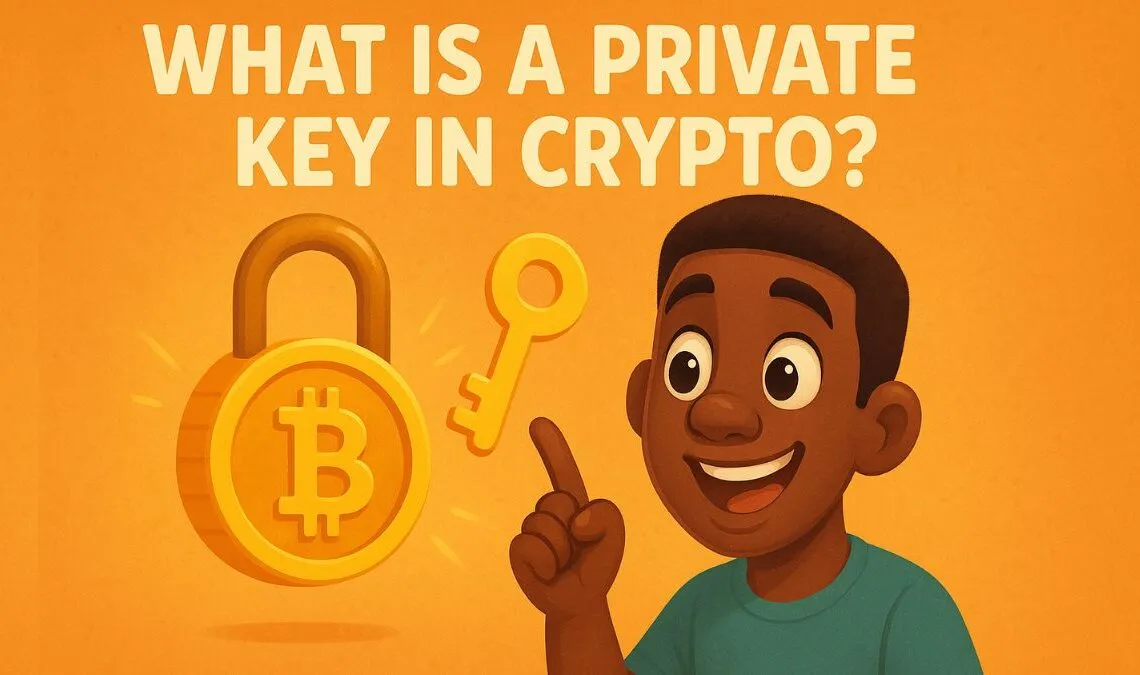If you use a crypto wallet, you’re probably familiar with terms like “public address” or “seed phrase.”
But behind every wallet — and every transaction — lies one critical element: the private key.
A private key is a long, unique string of numbers and letters that acts as your master key to access and control your crypto. If someone gets it, they can take everything. If you lose it, your funds could be gone forever.
In Web3, there’s no password reset. No help desk. No backup server.
That’s why understanding and protecting your private key is one of the most important things any crypto user can do.
In this guide, you’ll learn:
- What a private key is (and how it works)
- The difference between a private key, public key, and seed phrase
- What happens if it’s exposed
- And how to protect it like your digital life depends on it — because it does
Want to understand what are cryptos? Start with: What Is a Cryptocurrency? A Beginner’s Introduction
What Is a Private Key?
A private key is a long string of letters and numbers that gives you full control over your cryptocurrency.
It’s the cryptographic equivalent of your wallet’s master password — but there’s no reset button.
When you create a crypto wallet, your private key is automatically generated. This key is used to sign transactions, prove ownership, and access your funds on the blockchain.
Think of it like this:
Your public address is your email.
Your private key is your email password — the one no one should ever see.
Why It’s So Important
- Whoever has the private key controls the crypto.
- It doesn’t matter whose name is on the account — ownership is defined by who can sign transactions with the correct key.
- That’s why in crypto, there’s a famous saying: “Not your keys, not your crypto.”
Fun Fact: Private keys are typically 256-bit numbers — so complex that brute-forcing one would take longer than the age of the universe (even for a supercomputer).
Private Key vs Public Key vs Seed Phrase
These three concepts are closely connected — but they’re not the same thing.
Understanding the difference is essential for keeping your crypto secure.
Private Key
- A secret cryptographic code that gives you full control over your crypto
- Used to sign transactions and prove ownership
- Must be kept completely private — if someone else gets it, they can steal your funds
Public Key (or Public Address)
- Derived from the private key using cryptographic algorithms
- It’s what you share with others to receive funds
- Anyone can see it, just like a username or email address
Seed Phrase (or Recovery Phrase)
- A set of 12 or 24 random words that can regenerate your private key
- It’s a human-readable backup
- If someone has your seed phrase, they can regenerate your wallet on any device
Think of it like this:
Seed phrase → regenerates your private key → which creates your public address
Why It’s So Important (and Dangerous)
Your private key is the single most powerful element in the crypto world.
With it, you can send transactions, access your funds, interact with dApps, sign smart contracts, and prove that you are the rightful owner of your crypto.
But here’s the critical part: there are no backups.
If you lose your private key (or the seed phrase that generates it), your crypto is gone — forever.
And if someone else gets access to it? They can steal everything in seconds, and there’s no way to reverse the transaction or freeze the wallet.
This is what makes the private key both revolutionary and risky.
In traditional finance, banks can recover your password or freeze your account. In Web3, you are the bank — and the system assumes you know how to protect yourself.
It’s one of the most empowering aspects of crypto — and one of the most unforgiving.
How to Keep Your Private Key Safe
If you take just one thing away from this article, let it be this:
Never store your private key online.
Not in your email. Not in your phone’s notes. Not in a Google Doc.
Anything connected to the internet is vulnerable — and hackers know exactly where to look.
The safest way to protect your private key is by using a hardware wallet, also known as cold storage. These devices keep your private key completely offline, away from prying eyes and malware.
At the very least, you should write down your seed phrase — by hand — and store it in two separate, secure physical locations. Think of it like a physical backup for your digital vault. Fireproof safes, locked drawers, or even metal backup plates are common among serious users.
Avoid taking photos of your seed phrase or copying it to a USB drive unless it’s encrypted and stored offline. The moment your key is exposed to the internet — even briefly — it can be compromised.
Pro Tip: Treat your private key like your life savings in a suitcase. Would you leave it open on your desk? Probably not. So don’t do it with your wallet either.
Private Key FAQs
-
Can I recover a lost private key?
No. If you lose your private key and don’t have your seed phrase saved, there’s no way to recover access to your wallet.
That’s why secure backups are absolutely essential in crypto.
-
What happens if someone gets my private key?
They can immediately access and drain your funds. There’s no undo button in crypto — and transactions are irreversible. If you believe your private key has been compromised, move your assets to a new wallet immediately.
-
Is a seed phrase the same as a private key?
Not exactly. Your seed phrase generates your private key, which then generates your public address.
It’s like a master backup — easier to write down, but just as sensitive.
-
Can I store my private key online if it’s encrypted?
Technically yes, but it’s still risky. Even encrypted files can be stolen, especially if stored in the cloud.
Cold storage (offline) is always safer.
-
Is MetaMask safe for my private key?
MetaMask encrypts your private key in your browser, but it’s still considered hot storage (connected to the internet). For small amounts or frequent use, it’s fine — but for long-term storage, a hardware wallet is strongly recommended.
Want how to keep your coins protected? Read: How to Keep Your Crypto Safe in 2025 – Security Best Practices
Final Thoughts: Your Private Key Is the Heart of Your Crypto Life
In the world of crypto, your private key isn’t just a password — it’s your identity, your access, and your ownership.
It’s the one thing standing between you and complete loss, or total control.
Understanding how it works — and how it differs from your public address or seed phrase — is essential if you want to navigate Web3 confidently and safely.
Remember:
If someone has your private key, they have your crypto.
If you lose your private key, you lose your crypto.
So treat it with the same care you’d give your real-world bank vault.
Keep Learning:
Lost access to your wallet? Here’s what to do: What Happens If You Lose Access to Your Wallet?








